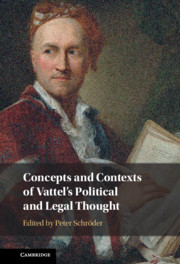Book contents
- Concepts and Contexts of Vattel’s Political and Legal Thought
- Concepts and Contexts of Vattel’s Political and Legal Thought
- Copyright page
- Contents
- Contributors
- Acknowledgements
- Concepts and Contexts of Vattel’s Political and Legal Thought
- Part I Historical and Intellectual Contexts
- Part II Concepts
- Part III Receptions
- 10 Vattel’s Reception in British America, 1761–1775
- 11 Tradition and Revolution
- 12 Vattel’s Law of Nations in Late Eighteenth- and Early Nineteenth-Century Greece and Italy
- 13 Reception of Vattel in Eighteenth- and Early Nineteenth-Century England and Scotland
- 14 Receptions of Vattel in Nineteenth- and Twentieth-Century International Law
- 15 Vattel’s Reception in International Relations
- Index
- References
14 - Receptions of Vattel in Nineteenth- and Twentieth-Century International Law
from Part III - Receptions
Published online by Cambridge University Press: 11 June 2021
- Concepts and Contexts of Vattel’s Political and Legal Thought
- Concepts and Contexts of Vattel’s Political and Legal Thought
- Copyright page
- Contents
- Contributors
- Acknowledgements
- Concepts and Contexts of Vattel’s Political and Legal Thought
- Part I Historical and Intellectual Contexts
- Part II Concepts
- Part III Receptions
- 10 Vattel’s Reception in British America, 1761–1775
- 11 Tradition and Revolution
- 12 Vattel’s Law of Nations in Late Eighteenth- and Early Nineteenth-Century Greece and Italy
- 13 Reception of Vattel in Eighteenth- and Early Nineteenth-Century England and Scotland
- 14 Receptions of Vattel in Nineteenth- and Twentieth-Century International Law
- 15 Vattel’s Reception in International Relations
- Index
- References
Summary
The turn of the nineteenth century is widely seen in histories of international law as a watershed moment, when the naturalism of the eighteenth century paved the way for legal positivism in the nineteenth and twentieth centuries. Intellectual historians and legal theorists have generally hailed Vattel as the truly decisive break from the earlier tradition of jurisprudence associated with Gentili and Grotius. The natural law framework of his predecessors relied on universally recognizable principles based in reason, whereas Vattel’s emphasis on consent and voluntarism oriented ‘international law … on its positivist career’ and infused it with ‘wholesome realism.’
- Type
- Chapter
- Information
- Concepts and Contexts of Vattel's Political and Legal Thought , pp. 277 - 295Publisher: Cambridge University PressPrint publication year: 2021



